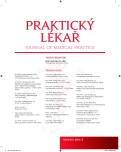-
Medical journals
- Career
Monitoring of nutritional status of elderly patients during hospitalisation
Authors: A. Pokorná; L. Maixnerová 1 2
Authors‘ workplace: Masarykova univerzita, Brno Lékařská fakulta, Katedra ošetřovatelství Vedoucí: doc. PhDr. Miroslava Kyasová, Ph. D. 1; Vojenská nemocnice, Brno Interní oddělení Primář: plk. MUDr. Tomáš Brabec Oddělení A Vedoucí lékař: MUDr. Petr Slabý 2
Published in: Prakt. Lék. 2013; 93(5): 221-225
Category: Of different specialties
Overview
Aim:
Nutritional status is known as a major determiner of the quality of life in the general population. It is even more important a determiner in old age. Health workers should pay special attention to the elderly during hospitalisation since they are at greater risk of developing malnutrition.Methods:
The prospective study (six months period) evaluated 104 elderly persons hospitalised in general wards. The basic data, weight, height, body mass index (BMI), diet, dyspepsia etc. of each patient were recorded. The relation between the level of self-care (ADL test), mental status (MMSE-Folstein test) and nutritional risk score was evaluated. For statistical analyses we used Pearson chi-square, Kruskal-Wallis test, Mann Whitney U test and Fisher exact test.Results:
We found a statistically significant relationship between the changes of the nutritional status and MMSE. The age of the persons monitored was not statistically significant in relation to the nutritional status. Comorbidity was statistically significant to the nutritional status score in the beginning of the monitored period. Polypragmasia influences the nutritional status.Conclusion:
The quality of nutritional status influences the quality of life in the elderly during hospitalisation. It is efficient to use standardised tests not only for the nutritional status of elderly person.Keywords:
nutrition in old age – malnutrition – nutritional monitoring – nutritional support
Sources
1. Akcent – Informační kanál Všeobecné zdravotní pojišťovny. Senioři jsou nejen v lůžkových zařízeních ohroženi podvýživou. Florence 2012; č. 3 : 1.
2. Belafsky PC, Mouadeb DA, Rees CJ, et al. Validity and reliability of the eating assessment tool (EAT - 10). Ann Otol Rhinol Laryngol 2008; 117(12): 919–924.
3. Benešová P, Mikulajová P, Mandysová P, Škvrňáková J. Polykací funkce u seniorů. Sestra 2011; 10(21): 62–64.
4. Grofová Z. Výživa ve stáří. Medicína pro praxi 2009; č. 1 : 42–43.
5. Kalvach Z. a kol. Geriatrie a gerontologie. Praha: Grada Publishing 2004.
6. Kohout P, Kotrlíková E. Základy klinické výživy. Praha: Forsapi 2009.
7. Kubešová H., Weber P., Polcarová V. a kol. Výživa ve stáří. Medicína pro praxi 2006; č. 3 : 118–123.
8. Mandysová P., Ehler E., Škvrňáková J. Porušené polykání: opomíjená ošetřovatelská diagnóza? Profese 2011; 3(1): 16–20.
9. Navrátilová M, Stárková L. Malnutrice u geronto-psychiatricky nemocných. Psychiatrie pro praxi 2004; č. 5 : 84–87.
10. Pidrman V. Demence. Praha: Grada Publishing 2007.
11. Salva A, Pera A. Nutrition and ageing: Screening for malnutrition in dwelling elderly, Pub Health Nutrition 2001; 6A(4): 1375–1387.
12. Starnovská T. Nutriční péče. Medicína pro praxi 2011; 8(3): 144–145.
13. Starnovská T. Standardizace nutriční péče v domovech pro seniory. Čtvrtletní noviny Nutricia clinical 2007; č. 1 : 8.
14. Tomíška M. Co můžeme udělat pro výživu pacienta s nádorovým onemocněním. Onkologická péče 2007; č. 3 : 4–7.
15. Topinková E. Geriatrie pro praxi. Dotisk 1. vyd. Praha: Galén 2010.
16. Topinková E. Využití standardizovaných škál pro hodnocení stavu výživy u starších nemocných. Čes Ger Rev 2003; č. 1 : 6–11.
17. Voleková M, Šatník V. Manuál klinickej výživy. Martin: Osveta 2008.
18. Vorlíček J. Potřebujeme standardy nutriční péče v onkologii? Onkologická péče 2007; č. 3 : 2–3.
Labels
General practitioner for children and adolescents General practitioner for adults
Article was published inGeneral Practitioner

2013 Issue 5-
All articles in this issue
- Functional anatomy of parenting
- Proton pump inhibitors – new mole-cules, new knowledge
- Differential diagnosis of the most frequent perianal lesions in a general practitioner’s surgery
- Monitoring of nutritional status of elderly patients during hospitalisation
- Risk factors of working environment and occupational diseases reported in the Czech Republic in 2012
- Warfarin skin necrosis without protein S, protein C deficiency or other procoagulant state
- General Practitioner
- Journal archive
- Current issue
- Online only
- About the journal
Most read in this issue- Warfarin skin necrosis without protein S, protein C deficiency or other procoagulant state
- Differential diagnosis of the most frequent perianal lesions in a general practitioner’s surgery
- Proton pump inhibitors – new mole-cules, new knowledge
- Risk factors of working environment and occupational diseases reported in the Czech Republic in 2012
Login#ADS_BOTTOM_SCRIPTS#Forgotten passwordEnter the email address that you registered with. We will send you instructions on how to set a new password.
- Career

